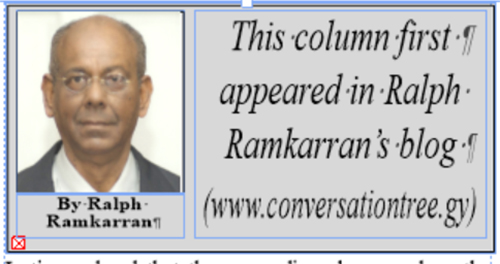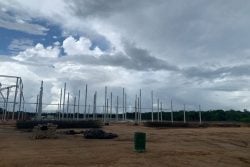The Leader of the Opposition, Mr. Bharrat Jagdeo, issued an invitation to President Granger to debate race, in the context of which political party in government has done more for African Guyanese. The immediate issue was the rejection by the casting vote of the Chairman of the Elections Commission of Vishnu Persaud as Deputy Chief Election Officer, which the Leader of the Opposition described as ‘unfair.’ The issue spawned accusations and counter accusations of racial discrimination.
The Kaieteur News reported on Mr. Jagdeo’s challenge as follows: “I am prepared to debate race relations and which party has contributed to worsening race relations in Guyana. I can talk to him (President Granger) about this fallacy and the myth that they keep perpetuating that they have done more for Afro-Guyanese than the PPP…” He stated that he is prepared to match the record of the People’s National Congress between 1964 and 1992, and then from 2015 to present, as against the PPP’s 23 years in office… According to Jagdeo, the debate can be on several grounds, including employment practices, access to wealth, land and businesses… “I am sure that you will see a pattern with Afro-Guyanese having fared better in that period under the PPP than ever under the PNC rule. I am prepared to debate that openly.”
Neither evidence nor debating skills, but the logic of race, will determine the outcome. The logic of race in Guyana is that perception and emotion would be the determining factors. Indians will never be convinced that they were not discriminated against during the PNC’s and now APNU+AFC’s terms of office. Likewise, Africans will never be convinced that during the PPP’s terms of office, they did not suffer discrimination. Hence, the absurdity and futility of any such debate. Africans and Indians are conditioned to view experiences and realities through perception, emotion and, yes, prejudices. These are conditioned by history and culture and the ethnic-based organisation of politics in Guyana, which will not change in the immediate future. It should be understood that it is not bad people but our ethnic make-up and history of competition for scarce resources that have spawned our ethnic politics. And it is not bad people who seek to sustain political power by having their (race-based) supporters to vote for them and to be in positions when in government. It is the logic of ethno-politics in an ethnically charged political environment. All that this proves is that we are normal people. Our situation exists in many countries in the world.
The logic of race and politics resulted in the PNC obtaining 40 percent of the votes in 1992 when it should have been decimated. And if Mr. Jagdeo is right, it is the logic of race and politics that has resulted in the PPP not obtaining African support at elections. People simply want their ‘own’ party to represent them. Their reasoning goes beyond race. It is also about feelings of security.
Many good people have recommended policies to improve ‘race’ relations, which have been implemented. More recently, the Ethnic Relations Commission and the Ministry of Social Cohesion have been put in place. These may have contributed to a state where Guyanese live and work peacefully together. But socially and politically, and at election time, they go their own way. Nothing has succeeded in persuading Guyanese to vote on policies rather than race. Our experience in Guyana and elsewhere is that it is impossible to break this debilitating ethno-political deadlock. Experience outside of Guyana has also shown that the answer lies in constitutional engineering that will provide an equitable basis for the political parties to work together in the executive. It has many challenges and doesn’t always work, but there is no other way.
I seek my readers’ indulgence to repeat suggestions I made before. I take the APNU+AFC’s manifesto proposals as the starting point. It was proposed that there be separate presidential elections. The person obtaining the second largest votes would be the prime minister and parties obtaining over fifteen percent of the votes would be invited to serve in the government. In order to break the heavily criticised constitutional stranglehold of the presidency on executive power, the equally criticised lack of power of the prime minister, and the minority as never being able to have the presidency, an equalisation of the powers of the presidency and the prime minister can be considered.
I suggest that they, together with the cabinet, share executive power as follows: The president would have executive responsibility for some portfolios such as foreign affairs, national security and economic affairs and would nominate and be responsible for the functions of ministers for those positions. The prime minister would have executive responsibility for all the other ministries and would likewise nominate ministers and be responsible for their functions. The nominees would have to be approved by a resolution of the National Assembly when it is convened. The prime minister would be the chair of cabinet, the approval of which would be required for all decisions. Executive authority in Guyana would be vested jointly in the president, prime minister and cabinet.






